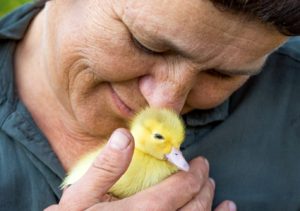THIS IS A VOLUNTEER, UNPAID POSITION IN THE TAMPA BAY AREA, BUT IT EXTENDS EAST AS FAR AS ORLANDO, SOUTH AS FAR AS MYAKKA, AND NORTH AS FAR AS DADE CITY.
Do you absolutely love ducklings? Would you like to care for ducklings until we find them a home? And most importantly, are you ok with living around the smell of duck poop? If so, then we have a great volunteer opportunity for you! If you think you have what it takes to be a duckling foster parent, read on.

WHAT TO EXPECT
Here’s some of what you can expect in your daily routine when you raise ducklings:
Upon the ducklings’ arrival, check each one over to make sure it has no injuries. Medical knowledge and experience aren’t required, but they will help.
Start each day off near dawn by cleaning up the duckling pen, giving the babies new food, water, and maybe snacks, and giving them attention. The amount of time needed will depend on the number and age of the ducklings you have in your care because more and/or older means more poopy mess to clean up. Younger ones also need more loving attention.
Be available to the ducklings throughout the day to be sure they’re ok and give them attention (you are their parent, after all). It’s also good if you can take them outside to play if it’s not too cold. This time must be supervised, whether it’s constant (if they’re very young) or only checking on them every 15-30 minutes (if they’re older, are used to being alone for a bit, and are in a place safe from predators). Depending on the size of their brooder, you’ll likely have to change their bedding midday. If you must leave the ducklings alone so you can work a normal eight-hour shift, we’ll understand, but it’s best if someone who cares about the ducklings can be there most of the time, in case a mishap occurs.
Evenings usually involve being assured that the ducklings have enough food and water to get through the night, possibly changing their bedding and cleaning their brooder, and giving them lots of love and attention. Always remember, you are their parent, and even though they have each other, they still look to you for love and care. You wouldn’t leave your young child alone, and the ducklings are no different.
You’ll be welcome to keep the ducklings as long as you like, but we’ll need you to keep them for at least their first three weeks of life (that’s about the time they start to get pretty stinky). We’d prefer that you foster them until they’re ready to live outside at around four months of age. Thanks to our generous donors, Birds In Helping Hands and others, we’ll be able to loan you the equipment necessary to keep them indoors, as well as supply the ducklings’ food. See our “Brooder Ideas” album on Facebook to get ideas of ways you could organize your brooder indoors, and your playpens and outdoor cages when the ducklings are older. Please note that we will not supply outdoor caging but will expect it to meet our safety standards if you choose to keep the ducklings through that stage.
PREFERRED EXPERIENCE
– Experience raising ducklings as pets
– Willingness to take direction
– Medical education, whether it’s formal or working side-by-side with someone who knows ducklings.
REQUIRED SETTING
– Indoor space where ducklings will be protected from weather and predators where they can see you (for their first six weeks) and you can monitor them. This can be a spare room or garage, or, it can be the middle of your living room or kitchen, as long as the babies know you’re there for them if they need you. They’ll poop more and get smellier as they grow, so the more space you can give them, the less often you’ll have to change their bedding.
– If you plan to keep them beyond six weeks of age, you’ll need an outdoor space for them to live once they get enough adult feathers to stay warm. This place needs to be well protected from predators. If you wish to keep the ducklings through this stage, we’ll go over the requirements with you.
– Small ducklings can be around pets if those pets are used to and have a history of being safe around small, squeaky animals. Once ducklings reach three weeks of age, however, they tend to get curious about the animals and will likely nibble them. The animals must be used to this so they won’t retaliate when (not if) the ducklings do it. If you have pets that aren’t used to this, you must be able to keep them separated from the ducklings at all times.
A SPECIAL NOTE ABOUT CHILDREN
Most children love ducklings and want to hold them. We love the idea of our ducklings being socialized, but it must be done in a safe manner and supervised at all times (with young children). Getting children involved with the care of ducklings teaches them a lot—especially how hard and messy it can be.
Fostering ducklings can be a good way to see what it’s like to actually own them, but you can give them back at the end of your care period. If you would like to foster for us, please answer the questions, and we’ll contact you.
